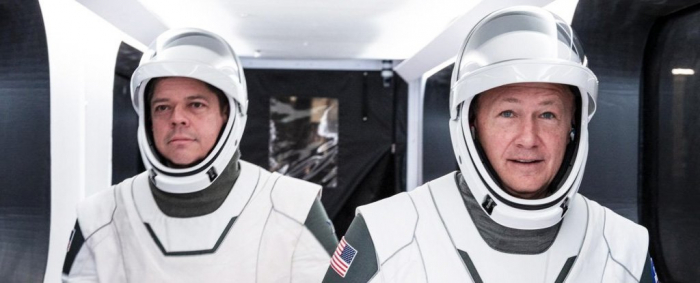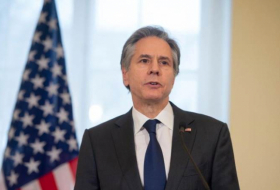Their flight on the company's Crew Dragon spaceship will mark the first time an American spacecraft has carried NASA astronauts since the Space Shuttle program ended in 2011.
Behnken and Hurley's liftoff is expected to launch a new era of US spaceflight, since it will allow NASA to stop relying on Russian launch systems to get astronauts into space. It will probably also make the two astronauts the first to ever fly a commercial spacecraft.
"Bob and I were lucky enough to be selected together," Hurley told The Atlantic in September. "As we get closer to launch, things in the last year have actually been pretty hectic. We've been spending increasing amounts of time in California, because that's where most of the work is being done for Dragon."
In preparation, they have run through emergency procedures, undergone extensive training the Crew Dragon's mechanisms, worn their new spacesuits, and met with SpaceX CEO Elon Musk.
"People to a degree think it's pretty glamorous to be able to go into space, but it's actually like a messy camping trip," Hurley told Reuters in June.
Here's how the astronauts were selected and how they're preparing to fly Crew Dragon to the space station.
The selection
In 2018, NASA selected Behnken and Hurley to be the first astronauts to fly SpaceX's new spaceship. They will probably be the first to fly any commercial spacecraft.
SpaceX developed its Crew Dragon spaceship as part of NASA's Commercial Crew program, a competition that spurred private companies to develop new astronaut-ready spacecraft.
In total, NASA selected nine astronauts to conduct the first human test flights of the Crew Dragon and its Boeing counterpart, the CST-100 Starliner.
Musk expects to send Behnken and Hurley to the International Space Station on Crew Dragon's first manned test flight - called Demo-2 - in April, May, or June.
That would be the first time an American spacecraft has launched astronauts since 2011, when the space shuttle program ended.
Behnken and Hurley have been working closely with SpaceX on the Crew Dragon's development since 2015, so they're well equipped to fly the spacecraft.
Both men started out as military pilots. Hurley spent 24 years as a test and fighter pilot in the Marine Corps, logging over 5,500 hours in more than 25 different aircraft. Behnken was an Air Force test pilot. He logged over 1,500 hours flying more than 25 aircraft.
NASA hired them both as astronauts in 2000, and they became friends when they worked together in the space shuttle program.
Behnken flew on two space shuttle missions, logging over 708 hours in space with a total 37 hours of spacewalks. Hurley piloted two space shuttles, including the very last one, spending a total of over 683 hours in space.
Since NASA's final space shuttle flight, however, the agency has relied on Russia's Soyuz system to ferry its astronauts to and from the International Space Station. But Russia has nearly quadrupled its prices over a decade. A single round-trip seat now costs NASA about $US85 million.
A Crew Dragon seat is expected to cost about $US55 million. (Though that doesn't include the $US1.2 billion NASA spent on the new spacecraft's development in hope of replacing Soyuz.)
Preparation exercises
Behnken and Hurley's preparation for the first crewed flight involves intensive training exercises and dry runs of launch day procedures.
In total, the two astronauts have worked together for two decades. "Bob and I got pretty close. It's just like anything else-you gravitate to certain people," Hurley told The Atlantic. "We spent a whole bunch of time together, and I got to the point where I thought, 'Hey, maybe this guy isn't so bad.'"
In 2003, when the Space Shuttle Columbia broke apart on re-entry, killing its seven-member crew, Hurley and Behnken were stationed on the runway together.
"I've seen Doug's behaviour at my wedding, I've seen Doug's behaviour in an aeroplane, and we've worked together dealing with the aftermath of the worst thing you can imagine happening in our career field. I can predict his actions. He can predict mine," Behnken said.
Behnken, Hurley, and other Commercial Crew astronauts have advised SpaceX as it develops the Crew Dragon's inner workings, consulting on the designs of switches and control screens.
Commercial Crew astronaut Suni Williams previously told Business Insider that she and other astronauts had warned SpaceX and Boeing that early versions of their spaceships showed the crew too little on-screen information.
"Automation can help us, but then you do have to watch out," Williams said. "We talked to the both partners about: How do I check this? I have a timeline in front of me - how do I know these things are happening? Where do I check? Where do I look? What's my confirming cue?"
"We spend a couple of days every week somewhere in Florida or California, evaluating the final designs. We're not the beneficiaries of a super-formal training program - it's kind of being developed as we go," Behnken told The Atlantic.
Emergency escape
Safety is the top priority, so Commercial Crew astronauts have practiced evacuating SpaceX's launch pad in the unlikely event of danger before liftoff. That emergency escape requires the astronauts to load into baskets on a zipline-like wire. Once they zip to the ground, an armoured vehicle picks them up.
After that escape exercise, Behnken said: "Each time today when we headed down the crew access arm, I couldn't help but think about what it will be like to strap into Dragon on launch day."
The astronauts have also run through the process of being retrieved from the Crew Dragon capsule after it splashes down in the ocean.
They have even done a dress rehearsal with the new SpaceX spacesuits.
"NASA has not done a flight-test program for a spaceship since the space shuttle. So you're talking late 70s, early 80s is the last time we kind of did this as an agency," Hurley said in a 2018 NASA video.
"Some of it is kind of re-learning those techniques and those things that you need to make sure that you're watching out for," he added.
Both men have said they're looking forward to trying out the new spacecraft and getting back up to the space station.
"When you get up there and look back at the Earth, I think there isn't anybody who that hasn't changed," Behnken told The Atlantic. "It really does change you, and hopefully for the better."
He added: "People ask us about commercialization of space, and I firmly believe that the more people we can get to go into space, the better off the planet's going to be."
Business Insider
More about: #SpaceX
















































